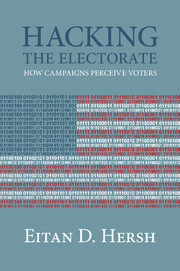Book contents
- Frontmatter
- Contents
- Acknowledgments
- 1 Introduction
- 2 The Perceived Voter Model
- 3 The Policy Roots of Elite Perceptions
- 4 Campaign Perceptions Quantified
- 5 The Perceived Partisan
- 6 The Public Code of Racialized Electioneering
- 7 Persuadable Voters in the Eyes of the Persuaders
- 8 Voters Perceived in Social Networks and Consumer Files
- 9 Conclusion
- Appendices
- Notes
- Bibliography
- Index
9 - Conclusion
Published online by Cambridge University Press: 05 July 2015
- Frontmatter
- Contents
- Acknowledgments
- 1 Introduction
- 2 The Perceived Voter Model
- 3 The Policy Roots of Elite Perceptions
- 4 Campaign Perceptions Quantified
- 5 The Perceived Partisan
- 6 The Public Code of Racialized Electioneering
- 7 Persuadable Voters in the Eyes of the Persuaders
- 8 Voters Perceived in Social Networks and Consumer Files
- 9 Conclusion
- Appendices
- Notes
- Bibliography
- Index
Summary
Having investigated how the provision of public records affects elite perceptions, and how the perceptions, in turn, affect campaigns and voters, I now consider the normative questions that often motivate discussions of campaign data and strategy. As discussed in the introductory chapter, public discourse about campaign targeting can be framed as a debate between those who see value in campaigns using data to better understand their constituents and those who believe that microtargeting may lead to strategies that are harmful to democratic representation.
How does one make sense of this debate in light of the findings that campaigns are highly reliant on public records, such as voter registration records, to inform their perceptions? The findings influences the normative debate in two important ways. First, the findings draw attention to a new ethical concern about microtargeting, quite distinct from the question of whether the use of data in targeting is good or bad for democracy. The new concern is that the process by which campaigns acquire personal information – by leveraging administrative data – presents a conflict of interest that is susceptible to abuse. The conflict of interest results from a tension between politicians' political interests on the one hand and their administrative interests on the other hand.
Second, the findings serve to define the existing debate about political targeting and democratic representation as a debate over public policy. Whether one evaluates targeting strategies pursued by contemporary campaigns as good or bad for democracy, what I have shown is that campaigns' uses of these strategies are at the mercy of public policies which are always subject to reform. Debunking the myth of the secretive campaigns that use vast databases to pinpoint the preferences of every American citizen, it is clear that what campaigns are doing is not so much a product of technological innovation as of government regulations. Campaigns rely on voter registration laws and open records laws to perceive voters' political dispositions. These laws are levers.
Information
- Type
- Chapter
- Information
- Hacking the ElectorateHow Campaigns Perceive Voters, pp. 196 - 220Publisher: Cambridge University PressPrint publication year: 2015
